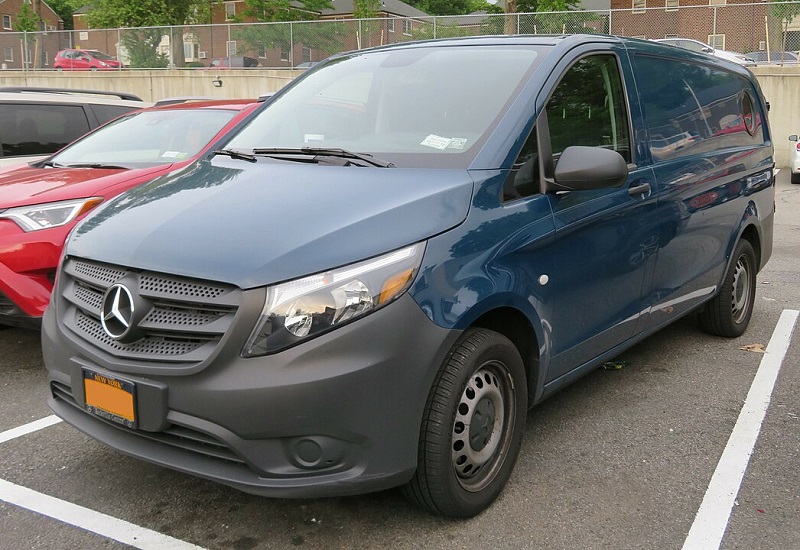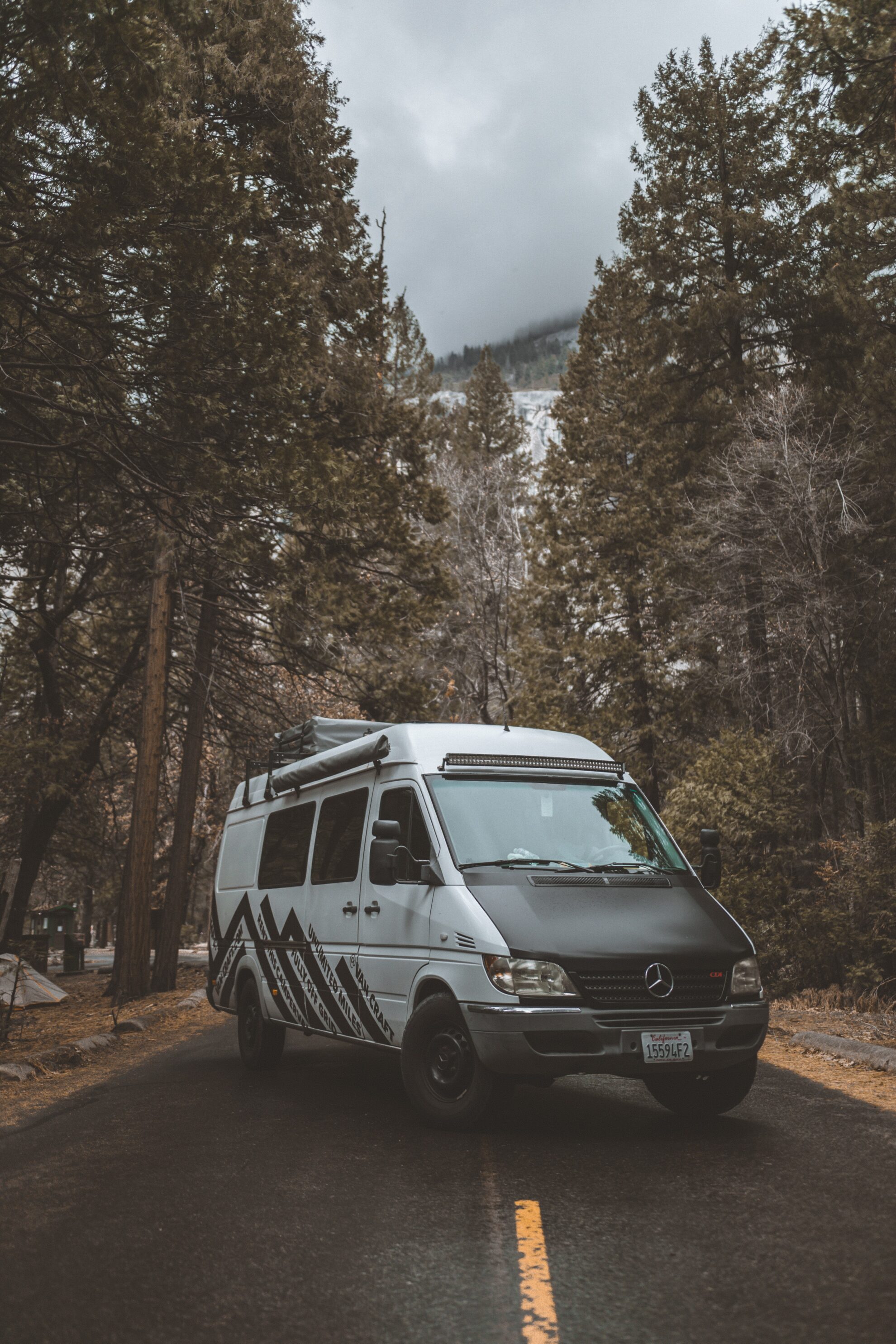Thanks for your support! If you make a purchase using our links in this article, we may make a commission. And, as an Amazon Associate, I earn from qualifying purchases. See the full disclosure here.
Updated February 21, 2024
Choosing the base for your 2024 camper van conversion is a big decision, and it can get a little overwhelming. This handy guide will walk you through what to look for when shopping for your van.
Plus, we’ll give you the 10 best vans for your van conversion and answer all your questions about van conversions!
- Pros and Cons of Doing a DIY Camper Van Conversion
- 9 Best 2024 Vans For Your Camper Conversion
- 1. VW Crafter
- 2. Ram Promaster
- 3. Ford Transit
- 4. Mercedes Sprinter
- 5. Chevrolet Express
- 6. VW Buzz
- 7. Mercedes Metris
- 8. Iveco Daily
- 9. Peugeot Boxer
- Related Reading:
- Is It Worth Converting a Van into a Camper?
- Pros and Cons of Hiring a Professional Van Conversion Company
- Is it Legal to Convert a Van into a Camper?
- Final Words About 2024 Camper Van Conversions.
- Related Reading:
Pros and Cons of Doing a DIY Camper Van Conversion
Doing your camper van conversion yourself can be rewarding and have a lot of benefits if you have the know-how. But, you’ll have to keep a few drawbacks in mind.
Pros
- Cost – The biggest advantage of DIY camper van conversion is cost. A DIY conversion will be significantly cheaper than a professional one, with the cheapest DIY conversions even costing $1,000 or less.
- Creative freedom – DIY gives you full control over your build. You can be sure that everything is built exactly to your specifications.
Cons
- Added expenses – You’ll need plenty of tools, including power tools, to do a camper van conversion. You may even have to buy or rent new tools, which can be an added expense.
- Know-how – Building a van will take some knowledge. If you don’t have any relevant experience building things, you might find it very challenging.
- Labor and time – A DIY van build requires physical labor, plus you’ll have to make the time in your schedule to do all that hard work.
9 Best 2024 Vans For Your Camper Conversion
Now that you know what to look for in a van to convert, let’s look at 10 of the best vans for your camper van conversion in 2024.
1. VW Crafter
First up on our list is the Volkswagen Crafter. Originally a rebadged sprinter, since 2017, the Crafter has been fully designed and built by Volkswagen.
Considering VW’s history with campervans, converting a VW van is a no-brainer. Like all VW vehicles, it boasts high build quality, with a large international service network to take advantage of. It has a variety of drivetrain options, including FWD, RWD, and 4WD. Plus, it gets great gas mileage, with an impressive 38.2 mpg.
Indeed, the Crafter is already a fairly popular option for conversions in Europe. But this brings us to the biggest downside of the Crafter: It isn’t sold stateside. So, if you’re in North America and want a Crafter campervan, you’ll have to import one.
2. Ram Promaster
While the Ford Transit and Mercedes Sprinter get most of the love in the camper van conversion world, their main competitor, the Ram Promaster, is well worth checking out.
It boasts several advantages over its main competitors, including:
- A spacious interior: Due to the Promaster’s wide, boxy frame with mostly vertical walls, it has exceptional interior space. If you want a bed that goes side-to-side rather than back-to-front, it’s one of your best options
- Front-wheel drive: The Promaster comes standard with FWD, which means lighter weight, better fuel efficiency, and more space in the van, plus better traction on slippery surfaces
- Cost: Because it’s less popular than other vans, it’s easier to find a Promaster at a good price, potentially saving you as much as $10k.
Of course, the Promaster isn’t without its downsides. Due to being less popular, it doesn’t hold its value as well, for example. And, it only comes with a gasoline option, so if you’re gunning for a diesel camper, you’ll have to look elsewhere.
3. Ford Transit
Ford’s Transit cargo van has become increasingly popular for camper van conversions over the past several years, and for good reason.
For one, Transits are just all-around great vans. They’re easy to drive, reliable, and get good gas mileage. And because they’re Ford vans, nearly any mechanic in the country can work on it without issue, and parts are easy to find and fairly inexpensive (which can’t be said of some other popular van options).
Combine this with great headroom and plenty of options like diesel or gas and RWD or AWD.
The biggest drawbacks of the Transit are mediocre gas mileage and a lack of 4×4 options. Also, some have reported that high-roof versions can be hard to find.
4. Mercedes Sprinter
The Mercedes-Benz Sprinter is such a popular option for camper van conversions it practically needs no introduction. The Sprinter has long been the van for camper van conversions, and it’s easy to see why.
Like most Mercedes-Benz vehicles, Sprinters are highly reliable, have great features, and are an absolute joy to drive. In fact, they’re widely considered the best driving experience out of all the major cargo vans.
They also boast some of the best gas mileage in their class, and plenty of options, including a factory 4×4 drivetrain option. In most categories, Sprinters are the best of the best, hands down.
But, that doesn’t mean Sprinters don’t have downsides. They’re the most expensive van option, and this is exacerbated by high demand, increasing costs while making them harder to find.
And while they’re highly reliable, if any issues do occur, they’re some of the most expensive and difficult vehicles to repair. Service centers and qualified mechanics are much scarcer than for a Ford or Dodge vehicle, and parts are also more expensive and harder to find.
5. Chevrolet Express
The Chevrolet Express isn’t a common option for camper van conversions, but that doesn’t mean it should be overlooked.
The biggest advantage of the Express is the price. It can be gotten cheaper than many of the other popular vans, due in part to lower demand. That frees up more money in your budget for your actual conversion.
Besides price, it’s an all-around solid van, and finding qualified mechanics and parts is easy and affordable.
Of course, the Express is a less popular choice for a reason. The only available drivetrain is RWD, there is no diesel option, and there is no high roof option. This last one is the biggest ding against it, as you’ll need to install a pop-up roof to have a decent standing room.
6. VW Buzz
The VW Buzz is perhaps the most unique option on our list. Inspired by the classic VW Bus, the VW Buzz is a fully electric van that’s perfect for eco-conscious campers.
The Buzz combines unequaled style with the exacting quality and German engineering you expect from a Volkswagen. And while it was initially a Europe-only option, it’s now coming stateside for 2024.
It is estimated to have a 260-mile range on a charge and will be able to charge from 10% to 80% battery in only 30 minutes.
Of course, there are a few things to consider with the Buzz. It’s not especially large, and at present, only comes in a passenger configuration, meaning more work to convert it. That said, for a fully electric camper, it’s an option well worth keeping your eye on.
7. Mercedes Metris

You can think of the Mercedes Metris as sort of being the Sprinter’s little brother. It’s a compact van, primarily designed for city use. If you’re looking for a compact van that can double as a camper and a daily driver, it’s an excellent choice.
It has all of the same advantages as a Sprinter: luxury quality, great to drive, and highly reliable. But it also has many of the same drawbacks, with expensive parts and labor being the biggest consideration.
Plus, because of its smaller size and lower roof, you’ll need to install a pop-up roof if you want any standing room.
8. Iveco Daily
The Iveco Daily isn’t well known stateside, due to being exclusive to Europe and some South and Central American countries. But if you can get your hands on one, they’re a great choice for a camper van conversion.
The Daily is a van that’s made tough and full of smart features, like their innovative smart controlled pneumatic suspension. They also boast great fuel economy and are a comfortable and enjoyable drive.
In fact, it’s such a great camper, that Iveco even sells a pre-converted version of the Daily, the Iveco Daily Camper.
9. Peugeot Boxer
The Peugeot Boxer is another foreign van option, although, unlike the other foreign vans on our list, it’s a bit easier to find. This is because they’re sold in Mexico, so you don’t have to get them from quite so far away.
Like the Ram Promaster, they’re a variant of the Fiat Ducato, and so the two have similar pros and cons.
Boxers have the advantage of being a bit more affordable than other Euro vans like the VW Crafter. It’s also available with a high roof option and a wider body than other euro van options. They’re also a good driver and are fairly reliable vans.
Related Reading:
– How Much Does Van Life Cost Per Month?
– 25 Must-Have Campervan Accessories
– What is a Stealth Camper Van for Off Grid Camping?
– Best Campervan Rental Companies: US and Canada
Is It Worth Converting a Van into a Camper?
“Is it worth converting a van into a camper?” isn’t an easy question to answer and will depend greatly on your situation. While at the end of the day, a camper van can hold its resale value, financially speaking, it’s not a sound investment the way a traditional home might be.
At best, you’ll likely only get back what you spent on it in the first place, and might not make a profit.
But a camper van conversion is more than just a financial investment, and you should see it as more than that too. Converting a camper van can cost a lot of time, money, and effort, and it’s not the easiest lifestyle change to make. But it can be an amazing change for the right person and completely worthwhile.
If you don’t mind the effort to make the change and adjustment to life in a camper van, the benefits can be huge. Living in a van brings tons of freedom and the ability to go anywhere, anytime. And getting a custom converted van means you can live that life just the way you want to.
So overall, yes, it is 100% worth it to convert a van into a camper van!
Pros and Cons of Hiring a Professional Van Conversion Company
There are a lot of great things about hiring a professional van conversion company for your conversion. But, there are also a few distinct downsides.
Pros
- Experience – A professional conversion company, especially a successful one, will have highly experienced staff performing the work. That means you can be confident you’re getting a high-quality, reliable build.
- Insurance – Professionally-built vans will be easier to insure than DIY.
- Less headache – You can save yourself lots of time, hard work, and frustration by paying a professional.
Cons
- More expensive – A professional camper van conversion is almost always going to be more expensive than DIY.
- Sketchy companies – You’ll have to do your research; if you do your conversion through an inexperienced, unvetted company, you run the risk of getting a low-quality van.
- Wait time – You might have to wait quite a while for your conversion, as popular van conversion companies are often booked months in advance. And that’s on top of the time needed to actually build the van.
Is it Legal to Convert a Van into a Camper?
Put simply: yes! There are no laws in the US that forbid a van conversion to a camper. But, you will likely have to register your vehicle as an RV, and different states may have different requirements for what qualifies as an RV.
Final Words About 2024 Camper Van Conversions.
Now, you have all the information you need to start picking the base for your camper van conversion. Whether you go professional or DIY, the perfect van for you is out there.
Maybe it’s a cargo van, a step van, or even a schoolie, but whatever it is, it’s ready and waiting for you to convert it into the camper of your dreams!
Related Reading:
– How Much Does Van Life Cost Per Month?
– 25 Must-Have Campervan Accessories
– What is a Stealth Camper Van for Off Grid Camping?
– Best Campervan Rental Companies: US and Canada
About the author:
Jennifer and Kendall are avid RVers and part-time van lifers who share their years of experience both as full-time RVers and nomads through writing.
Jenn and Kendall have explored Canada, the USA, and Mexico while RVing and living full-time in all 3 countries.
They have been fortunate to work not only as part of the RVBlogger team but also with RVLife, DIY RV, Camper Report, RV Magazine, Rootless Living, Vanlifers, and more.
They have also shared their RV experience through DashboardDrifters.com and are the founders of RVSpotDrop, a web service for full-time RVers.



Hi What’s the biggest van that I can convert into a camper van? However, I forget what van is that so I’m looking. Thanks!